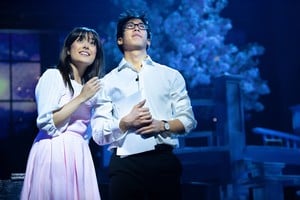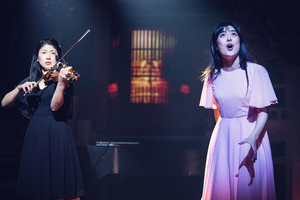Review
by Andrew Osmond,| Synopsis: |  |
||
Kosei is a burned-out child prodigy. He had the makings of a great piano player, but he was traumatized by the harsh discipline and early death of his mother. Now a teen, Kosei can't even hear the notes when he plays the piano, and he's sworn to abandon that part of his life for good. But then a transfer student joins his school, a girl violinist called Kaori, who knows about Kosei's past. She's determined Kosei will play the piano again and that they'll perform together, whatever it takes... |
|||
| Review: | |||
It's a trend now; no fewer than three major stage productions in London are based on anime or manga. But the newest, Your Lie in April: The Musical at the Harold Pinter Theatre (sic) off Leicester Square, is different. That's partly because it is a musical, buzzing with energy and great fun, despite the somber parts of the story. But it also brings a much wider genre of anime to the London stage than its predecessors. Your Lie in April follows two productions based on Ghibli films by Hayao Miyazaki, My Neighbor Totoro, by the Royal Shakespeare Company, ran at London's Barbican Centre and will transfer to the West End next year. Spirited Away is in the West End already. Both titles have mainstream recognition beyond anime fans. They're stories of children meeting magic beings in the way of Alice in Wonderland, aimed at broad family audiences. Moreover, the creators of the source films, Hayao Miyazaki and Studio Ghibli, have striven to distance them from other anime and manga. In contrast, Your Lie in April is the stuff of a thousand anime and manga. It's an emotional teenage drama in which the magic, both light and dark, is the magic of adolescence. The musical heightens young feelings in the brashest ways, turning a bike ride or a stargazing session into rhapsodies of joy. It's a boy-meets-girl story, though it also highlights the boys and girls who lament they're the side characters while the friends they really like are spoken for. Ghibli doesn't avoid such material entirely – remember Whisper of the Heart. But Your Lie in April plumbs murkier depths, and it resonates specifically with post-Evangelion fandom. The male protagonist is psycho-tortured by a terrible parental figure who gives him orders that make him scream and curl up on the floor. In Evangelion, the dreaded order was Get in the robot, Shinji. In Your Lie in April, it's Play the piano, Kosei. It never seems a complete coincidence that piano playing was so prominent in Evangelion too. Your Lie in April's backstory is laid out in the musical's first song, showing the decline and fall of a gifted child. As a little boy, Kosei was a piano prodigy, a contest-winning machine, and a legend among his rivals. But his mother, who drove him to play in the first place, was never satisfied, forever driving him to do better. She died when Kosei was still small. Now a teen, Kosei is haunted by her specter, which is slow and limping on stage but seemingly indestructible in death, leaving Kosei cursed. When he touches the piano now, he can't hear a single note.  ©Craig Sugden Many ANN readers will know what comes later. Indeed, Your Lie in April is remembered by fans precisely for those later developments. Inevitably, fans with that knowledge will watch the musical differently from those coming to it new. The foreshadowing isn't nearly as obvious in the musical as it was in the anime, though there are big clues planted in a character's debut song. Stage shows are always affected by the circumstances when you see them. I went on press night (July 5), when the audience enthusiasm felt like half the performance. The constant applause and cheering fed into the play's cheekiest device. At one point, Kosei and Kaori complete a performance to in-story applause, and Kaori tells Kosei to listen to the clapping. She might as well have held up a card saying APPLAUD LOUDER. With an unreceptive audience, it would be embarrassing, but the risk makes the moment all the more fun. I must foreground something else which may not apply to other readers. I was seated in the Dress Circle, with a superb view of the stage but some distance from it (and to the side). From there, I often struggled to make out the words of the lyrics, catching roughly half or fewer, which may reflect my bad hearing, the acoustics in that spot, or both. To some viewers, this may be damning. For me, it was a minor irritant. The main song sentiments and story points were easy to catch – the latter are in the dialogue between songs. While the songs account for most of the runtime – there are eleven or twelve numbers in each half – the dialogue scenes are clear, amusing, and keep the energy high. Indeed, it's the energy, ideally supported by a willing audience, which impressed me most about the musical, more than its specific songs or other details. The energy is redoubled by the musical's hammered sentiments, which are less about young love than about youth itself, about its potential and the love of life. After the first act's jubilant escalation, the sudden return to seriousness in the second half damps things down for a while, but soon there are new kinds of uplift. A layman in musical theater, I was often more taken with the video projections. These go beyond FX glitter, doing an outstanding job in transitioning us between scenes. The action starts in a mother-haunted Gothic nightmare, which also suggests Kosei's sea-floor mindscape from the anime. Then the projections change, to idealized summer clouds or yearning sunsets, helping sweep us to lively school corridors or a darkened concert hall. The hall, though, soon becomes a courtroom from Hell, where pointing judges denounce you for crimes against music. In contrast, the set doesn't change much. There's a multipurpose assembly of steps and ledges, a stage turntable (used especially in music performances), and that eternal Japanese symbol of transitory youth, a blossoming tree. Dry ice billows on the floor at times, lockers trundle on in the school scenes, and when we've gone a long way beyond April, snow falls from the ceiling. The songs, composed by Frank Wildhorn with English lyrics by Carly Robyn Green and Tracy Miller, felt consistently pleasant while never quite producing a breakout hit. (I suspect the anime's opening number, “Hikaru Nara” by Goose House, could transfer superbly to the stage.) It was a non-song interlude that worked far better. At an especially fraught point, Kosei pours his soul into an extended solitary piano performance, endeavoring to cement his feelings in timeless music. When he ends, the audience breaks into perhaps the loudest applause of the evening - applause the character emphatically does not hear, in contrast to the earlier joke with Kaori.  ©Craig Sugden As with the songs, the actors feel consistently strong without a true standout. However, Yong deserves special applause for revving up the production from zero-to-sixty in his anguished opening number, “If I Can't Hear The Music,” which sets the emotional temperature for all that follows. In the original story, the main characters were obvious types, from Kosei's alt-Shinji to Tsubaki, the girl next door character who's played the role of Kosei's bossy sister a bit too well. Ultimately, the actors, including Rachel Clare Chan as Tsubaki and Dean John Wilson as Ryota, feel like they're animating familiar types, rather than going beyond them. That's hardly surprising, given the compression of the material. This is a two-hour musical adapting an eleven-book manga and a 22-part TV anime. The story is clear, but it has to move fast, and story and character points can feel introduced brusquely and bluntly, even when softened by song. For example, I felt there was too little time for us to take in Kaori's argumentative attitude towards Kosei, which is pushed on us in a comic duet (“Who Put You in Charge Here?”). As for the story's multiple resolutions, the subplot with Kosei's mother has a satisfying wrap-up. Kosei's little-boy self, played by a child, takes a central role in it, though the anime's talking cat doesn't make it to the stage. However, the very final concert left me dry-eyed. I preferred the anime's staging choices, which felt like a brilliant homage to the British film The Red Shoes. Just after, the musical's last crucial reveals – including what on earth was the lie in April – needed more space around them, even at the cost of extending the performance for a few more minutes. But even that's a context-bound judgment. I can't un-remember the anime, which is baggage that won't affect many of the audience. That presumably includes some anime fans, who may go to the musical because they've seen the enigmatic title mentioned somewhere but never found out what it meant. The musical must be banking on a wide crossover audience, from paid-up Your Lie in April fans to complete outsiders to anime who've just spotted there's a new West End musical in town. Judging by the noisy goodwill on press night, that crossover audience may come. |
|
The views and opinions expressed in this article are solely those of the author(s) and do not necessarily represent the views of Anime News Network, its employees, owners, or sponsors.
|
| Grade: | |||
Overall : B
Music : B+
+ A highly enjoyable stage version of a fan-favorite teen drama, which could set important precedents for other stage adaptations of manga and anime going forward. |
|||
| discuss this in the forum (1 post) | | |||